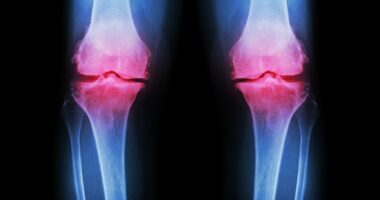Share this @internewscast.com
Wedding toasts and married couples have often stressed the advice: ‘Don’t go to bed angry’, but an expert has explained why doing the opposite might actually benefit the relationship.
Dr. Samantha Whiten, a clinical psychologist in Maryland, shared with the Associated Press that going to bed angry at your significant other might not be as bad as it’s made out to be.
‘All it does is make sure that people are fighting when they’re tired,’ she added.
Instead, couples can develop habits that help them get rest while also boosting their long-term relationship.
While it’s tempting to address issues immediately rather than letting them linger, Whiten noted that expecting conflicts to be resolved quickly and peacefully each night is unrealistic.
Whiten disputed the age-old advice, arguing that couples are ’emotionally dysregulated’ when they’re tired.
She referred to the acronym HALT, a common reminder in therapy that people should avoid serious discussions when hungry, angry, lonely, or tired.
Many people also drink alcohol at night, which she said doesn´t help create a calm environment.

Newlywed couples frequently hear the advice to ‘never go to bed angry,’ yet two psychology experts have pointed out that this guidance might actually be misleading.

Dr. Whiten emphasized that couples should avoid arguing when they’re exhausted, referencing the acronym HALT, which advises against fighting when you’re hungry, angry, lonely, or tired.
‘They are more likely to say and do things impulsively that they may regret,’ she said.
Dr. Sabrina Romanoff, a clinical psychologist in New York City, mentioned that nights might seem convenient for discussing issues since that’s often when partners are most available.
However, Romanoff suggested that it’s better to acknowledge that something needs to be discussed, take a pause, and set a time to revisit it.
Romanoff explained that it would be better to discuss the problem over lunch or coffee the next day, adding that the key is to follow through.
‘It speaks to a skill, to trust that your partner is really going to return to this thing that is really important to you,’ Romanoff said, noting that most couples have to practice.
It´s also about understanding your partner and being empathetic to what each of you needs. When one partner needs space, it´s incumbent on the other person not to interpret that space as rejection, Romanoff added.
Whiten said many couples in her practice have at least one person who feels they won´t be able to sleep until they resolve a fight. That´s often a sign of anxiety and discomfort with uncertainty.
‘People need to individually learn how they can regulate themselves and tell themselves it´s okay,’ she explained.

Dr Sabrina Romanoff agreed that it’s better to carve out time for hard conversations rather than cram them in at night before bed

The experts advised that couples take a beat when they’re arguing and revisit the discussion when they both are ready to maturely address the topic
‘The idea of being able to self-soothe is really key’.
Whiten clarified that the reverse of avoidance is no better. Many people may need space to process an argument, but they eventually need to return to their partner to address the topic.
The goal is that both people feel secure enough to acknowledge the disagreement, remember their relationship is more important than one argument, and agree to talk about it later, Whiten said.
‘When people can learn to do that, it´s really transformative.’
Romanoff suggested that couples establish regular check-ins. They don´t have to talk about the worst problems in their lives at a given point, but they should make a habit of small gestures of communication.
Even regularly asking how your partner´s day went creates a kind of scaffolding of emotional safety, she said.
When there is an issue, use ‘I’ statements, be clear about what you need, and try to create a plan for how the other person can deliver, Romanoff added. A request posed at an appropriate time will often be better received.
‘Timing is everything when it comes to communication,’ she said.
















